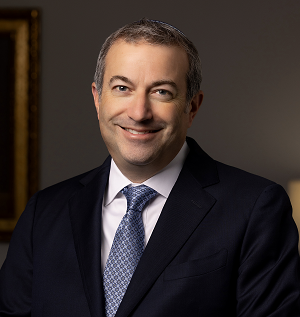I marched at Auschwitz this week. Here's what I say to campus protesters in America.
Elie Wiesel once warned of the “perils of indifference.” Reflecting on the horrors of the 20th century, he recognized that indifference can be tempting, even seductive. It is easier to look away from victims. It is easier to avoid interrupting comfortable lives. Indifference requires no response. Indifference is not a beginning, he said; it is an end.
I thought about Wiesel’s warning as I joined the annual International March of the Living in Poland on Monday. Since the Oct. 7 Hamas terrorist attacks on Israel, the world’s commitment to “never again” has been tested like rarely before. Amid a frightening rise in antisemitism on North American college campuses, I led a delegation of American and Canadian university presidents to join the march as a powerful reminder of what can happen when hate is left unchecked.
But the problem on campuses today is different from the one described by Wiesel. If in the past the problem was indifference, today it is indulgence.
University leaders are not indifferent. They care a lot. They care about protecting their students, both pro-Palestinian protesters and pro-Israel students.
But they have created a culture of indulgence. They indulge their students to break their institutions’ rules without consequences. They indulge one group of students at the expense of another who are being intimidated and threatened. And worst of all, they indulge lies without speaking the truth.
University leaders know Hamas is a terrorist organization

In the weeks after Oct. 7, I spoke with school presidents from across the country, and I can tell you that they know the truth. They know that although the politics of the Middle East is complicated, one element is clear: Hamas is a terrorist organization. They know its charter calls for the elimination of the Jewish state and the murder of Jewish people.
University leaders know that Hamas does not seek a two-state solution but the final solution.
Although they know this truth, many fail to say it. This is happening in part because universities have abandoned their core mission. Too many university leaders today see their roles as mere conveners of conversations. In their minds, the pursuit of truth requires them to be fully disengaged. Instead of educators, they have become hosts.
Although all will avow with sincerity that conversation must be limited when it threatens or intimidates other students, even on this score many have failed, preferring instead short-term tactics to placate a loud, protesting mob.
We must hear survivors’ stories. My family escaped death during the Holocaust.
What universities must do is reassert their role as educators.
With Columbia University in the news, a past episode on its campus illustrates this point well. In 2007, Columbia hosted Iran’s president, Mahmoud Ahmadinejad, for a speech before an address he was set to give to the United Nations the next day.
There was a great uproar at the time. Lee Bollinger, the First Amendment scholar who was then Columbia’s president, allowed the event to take place but introduced Ahmadinejad with a scathing attack on the Iranian leader’s repugnant positions. By his actions, Bollinger expressed that the principle of free speech required allowing even the most vile views to be aired, while also demonstrating that such views must be met with a clear moral response from the university.
That is free speech grounded in truth and moral clarity.
Opinion alerts: Get columns from your favorite columnists + expert analysis on top issues, delivered straight to your device through the USA TODAY app. Don't have the app? Download it for free from your app store.
Universities need to respond to extremists on campus
This is how universities must respond to extremists today. Extremists obscure language. They seek to muddle, not clarify. By now, does anyone really not understand the implications of the phrases "from the river to the sea" or "globalize the intifada"?
Extremists use terms as dog whistles to their followers with a veneer of defensibility. This kind of muddling requires a clear response from university leadership. The way to reclaim complexity and nuance is by informing the conversation with facts and insisting on moral clarity.
Imagine if the leadership of Columbia today had consistently said, since Oct. 7, that all matters of the Palestinian-Israeli debate are naturally open to conversation. That the way that Israel has prosecuted the war this year should be put to critical analysis and that we must similarly place under the microscope the Palestinian people’s relationship with Hamas.
But one thing all civilized people should agree upon is that Hamas is a terrorist organization and using its language and symbols is morally repugnant, not just to Jews but to all people of conscience.
Bring hostages home: What my daughter understands about Israel-Hamas negotiations that Netanyahu can't
If this was the tone and tenor adopted by university leadership across the country since Oct. 7, fewer campuses would be canceling their commencement ceremonies today.
Now is not the time for universities to indulge.
It is time for them to resume their primary role and educate.

Rabbi Ari Berman is the fifth president of Yeshiva University in New York City.
You can read diverse opinions from our Board of Contributors and other writers on the Opinion front page, on Twitter @usatodayopinion and in our daily Opinion newsletter.
This article originally appeared on USA TODAY: Campus protests reveal weakness of university leaders who indulge lies


